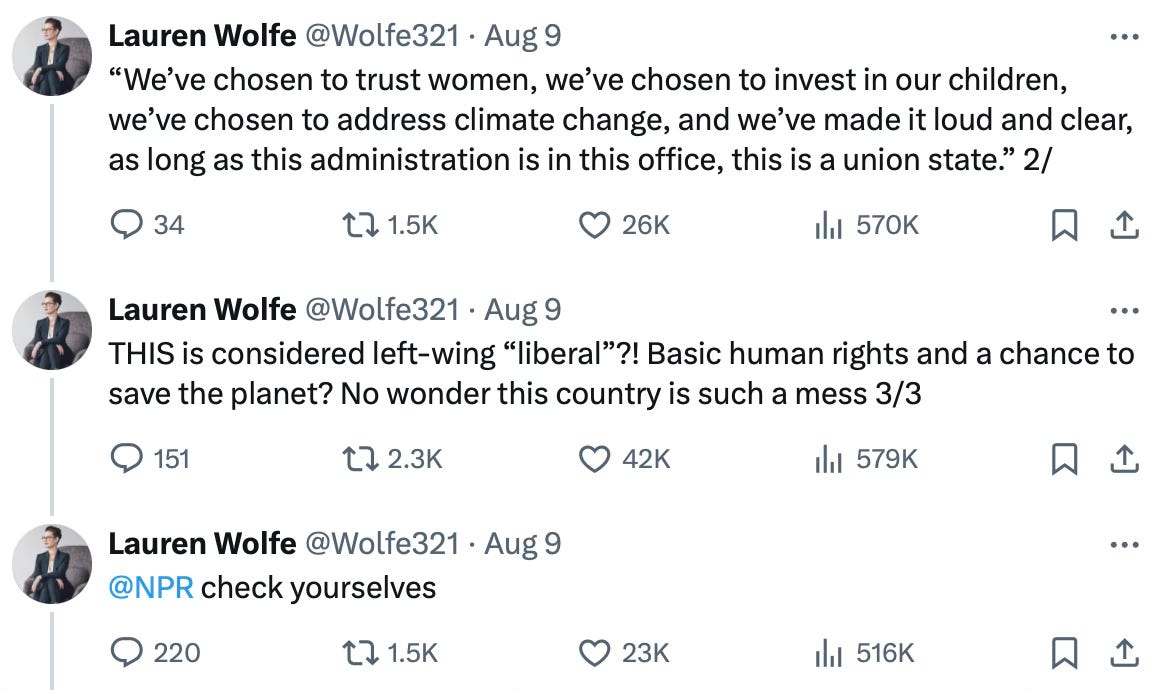Fearless reporting, a behind-the-curtains look at how journalism is made — and an unabashed point of view. Welcome to Chills.
It’s been a while since I had a tweet thread go viral, but it’s happened again. I’ve been thinking about why my recent words have resonated with people to the point where 5 million readers have viewed the first tweet in the thread. I think I know the answer, even if I don’t entirely understand it yet. Here are my tweets all pulled together as a paragraph:
NPR just said that when Tim Walz was reelected governor in 2022, he swung to the left. They then used audio of him saying: “We’ve chosen to trust women, we’ve chosen to invest in our children, we’ve chosen to address climate change, and we’ve made it loud and clear, as long as this administration is in this office, this is a union state.” THIS is considered left-wing “liberal”?! Basic human rights and a chance to save the planet? No wonder this country is such a mess. NPR check yourselves.
Since I tweeted this, people have sent me hundreds of messages about how the media has moved to the right since 2016. It’s a premise I used to dismiss instinctively, as a member of said media, but I’m considering it more carefully now.
For years, I’ve been defending the mainstream media as I have experienced it — as a non-monolith made up of a group of good-hearted and well-meaning people (for the most part), people who have worked hard to be as balanced in their coverage as humans can be — a complex issue about which I have a lot of deeply held beliefs.
Unfortunately, it’s been easy for consumers of media to believe that we, the press, are all part of a biased cabal. Part of the problem, I think, is that people don’t always distinguish between pundits and news reporters or op-ed pages and news pages.
A 2023 Lawfare article gets to the heart of why this lack of understanding is so detrimental to our country:
Misunderstandings about what the press does and how it operates, coupled with attacks on the mainstream media from Trump and others, have taken a toll on one of democracy’s most important institutions. A lack of public comprehension about the mechanics of journalism allows figures like Trump to misrepresent the media’s work — claiming, for example, that all anonymous sources are made up; that reporters don’t work to verify their claims but simply manufacture “fake news”; and that op-eds or editorials criticizing politicians, which in fact are walled off from the newsgathering side of papers, show that “straight news” reporting is hopelessly biased.
I have a number of good friends who work at NPR. I have long relied on the outlet for some of the best reporting in the world. I don’t plan to change my view of it as an excellent daily news source, but I am dismayed by what the reporter said that I wrote about in those viral tweets.
The best course forward, the best for freedom of the press and for our democracy, in my opinion, is to be mindful of what words the press use, to use a clear head as a consumer and to not accept political descriptions as fact, but also not necessarily as malicious. Humans are fallible, and the media is made up of humans.
It’s our job as media consumers and members of the press to keep our minds open — to keep our eagle eyes and bat ears on alert — always evaluating what we read and hear for truth.
Chills is self-funded, without ads. If you want to be a part of this effort, of revealing how difficult reporting is made — of sending me to places like Ukraine to report for you — I hope you will consider subscribing for $50/year or $7/month.





I've always felt that the best way to understand the media is to read an article about something that you are personally an expert in. I work in tech and every article about "the tech industry" is wrong in both trivial and significant ways.
ps I read the Guardian, The NY Times, Haaretz, and individual blogs, posts, etc. Especially
Beinhart and Mehdi Hasan. thanks again, Julie